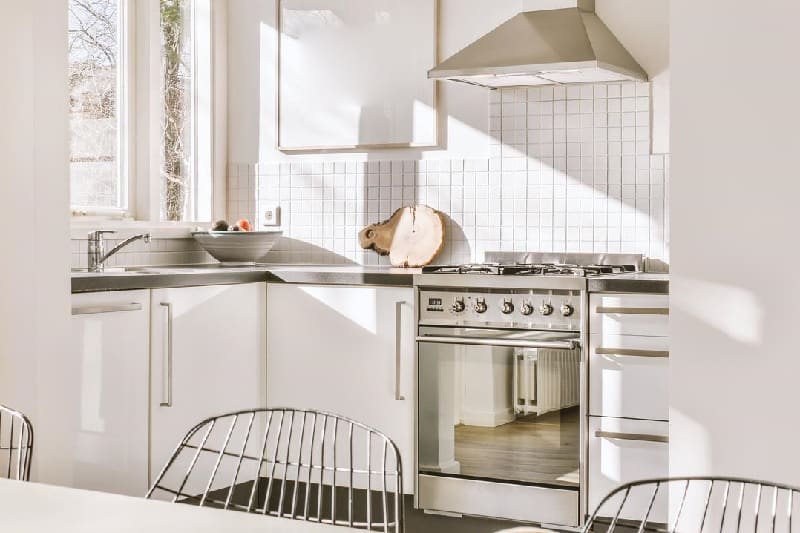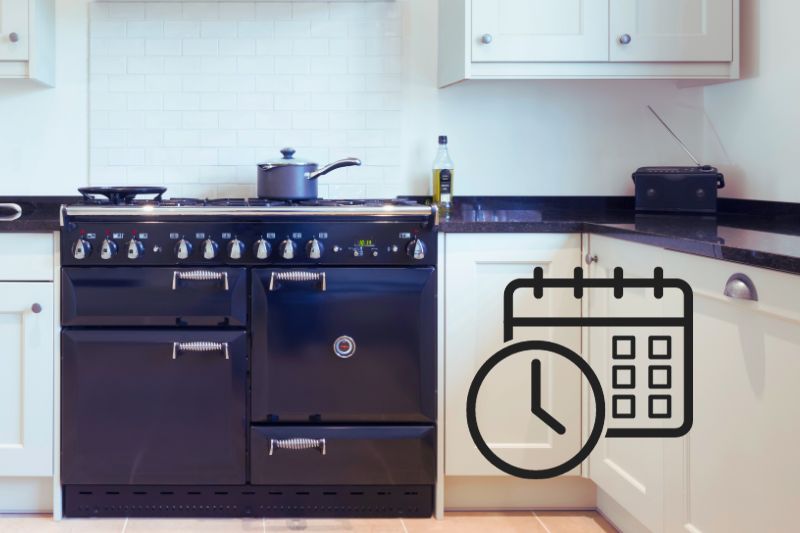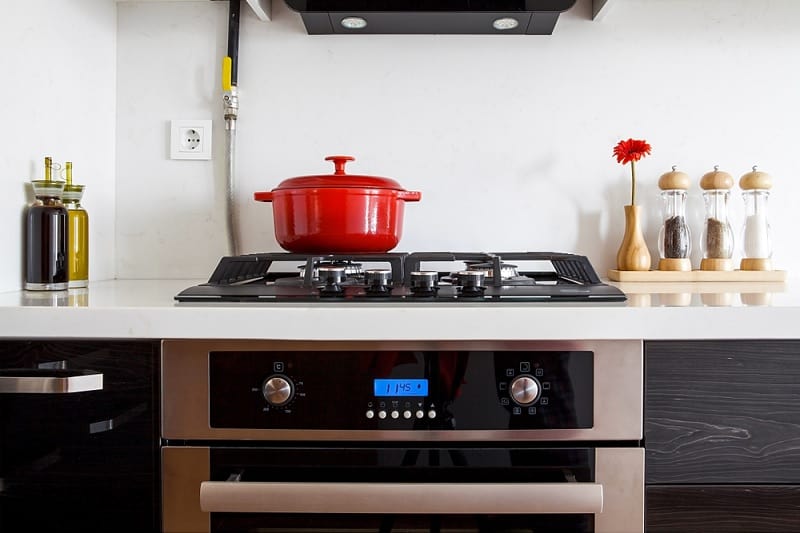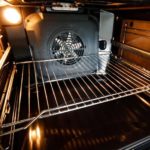At the heart of every kitchen lies a cooker. But unfortunately, no good thing lasts forever. Like all household appliances, your cooker will eventually break down, leaving you with the decision to either spend on repairs or buy a new replacement.
But how long do cookers last? How can you extend your cooker’s lifespan? And when does it need replacing?
This article delves into the factors that influence the lifespan of your cooker, from essential maintenance practices to the nitty-gritty details of wear and tear.
We also help you spot signs of damage and decide whether it’s best to repair or replace your cooker.
What Is the Average Lifespan of a Cooker?
On average, traditional gas or electric cookers last anywhere from 10 to 20 years. However, some may last even longer with proper care.
If an appliance is well-maintained and in good working condition, it may still be efficient and safe to use well after the typical lifespan range.
In fact, the lifespan of a cooker can vary depending on several factors, including:
- Quality of the appliance: Top cooker brands use higher quality internal components that help the cooker function optimally for longer. However, higher-end models with more advanced features may have a shorter lifespan due to the complexity of their components.
- Cooker maintenance: Regular maintenance, such as cleaning, checking for wear and tear, and addressing any issues promptly, can help expand the lifespan of your cooker. Fixing smaller problems as they arise helps prevent them from turning into larger, unfixable issues.
- Frequency of use: Wear and tear will ultimately cause the breakdown of all cookers. And the more you use the oven, the faster the signs of wear and tear become. A cooker that is only used once per week will last far longer than one used multiple times per day.

How Can You Make a Cooker Last Longer?
Taking proper care of your cooker is the best way to help it last longer. Below are some maintenance and usage tips to help you make your cooker last longer.
Following these tips and practising regular maintenance can help ensure your cooker operates efficiently for longer.
Tip 1: Regular cleaning
Clean your cooker regularly to prevent the buildup of grease and food residues. This includes the burners, oven interior, and any removable parts.
After every use, wipe down the exterior with a damp cloth to prevent dust and grime from accumulating.
Tip 2: Use your cooker properly
Always follow the manufacturer’s guidelines and instructions for properly using your cooker. Avoid slamming oven doors or forcefully turning knobs, which can damage the components. In comparison, gentle handling can prevent unnecessary wear and tear.
Tip 3: Use appropriate cookware
Use cookware that is appropriate for your cooker, and avoid using oversized or mismatched pots and pans. To protect the stovetop and prevent scratches, especially for electric cookers, don’t slide pots and pans across the cooktop surface.
Tip 4: Regular maintenance
Schedule regular maintenance check-ups with a professional appliance technician to catch and address any issues early on. Check and replace faulty or worn-out components promptly—if left unchecked, they’ll likely lead to worse problems.
Tip 5: Ensure good ventilation
Ensure proper ventilation in your kitchen, such as using a cooker hood or extractor fan. Ventilation can help prevent the buildup of heat and moisture, which can affect the performance of the cooker. Ventilation is also crucial for reducing mould growth in your house and removing cooking smells.
Tip 6: Monitor flames in gas cookers
If you have a gas cooker, regularly check the colour of the flames. A steady blue flame indicates efficient combustion and a properly functioning cooker. If the flame is yellow or uneven, it may indicate a problem that needs attention.
How to Tell If Your Cooker Is Breaking Down
If you notice any of the following signs, it’s a sign your cooker isn’t working as it should. It’s advisable to seek professional assistance to help repair the cooker promptly:
- If your oven is not heating evenly, it may result in unevenly cooked food. This could be due to issues with the heating element or thermostat. Problems with these components can also lead to inaccurate oven temperatures or slow preheating times.
- If you have a gas cooker and notice the smell of gas when it’s not in use, there may be a gas leak. Gas leaks are dangerous and require immediate attention. Turn off the gas supply and contact a professional technician.
- If one or more electric burners on your cooktop are not heating, it could be a sign of a faulty burner, switch, or wiring. For gas cookers, if the ignition system is not working correctly, it may result in difficulty lighting the burners.
- Unusual noises, such as rattling, banging, or grinding, can indicate problems within the cooker, often from components such as the oven fan. Investigate the source of the noise yourself or consult a professional for help and advice.
- Any visible damage, such as broken knobs, cracked glass, or damaged wiring, can compromise the functionality and safety of the cooker. Smoke or strange odours emanating from the cooker could indicate electrical or wiring problems.
- If your electric cooker repeatedly trips the circuit breaker, it could be a sign of an electrical issue that needs attention. The cooker may be overloading the circuit, overheating, or have another kind of electrical malfunction.
- Some modern cookers have digital displays that show error codes. If you see an error code on your cooker, refer to the user manual to see what it means. If it suggests something is wrong with your cooker, seek professional help.
If you experience any of these signs, addressing the issue promptly is essential. In many cases, early detection and repairs can prevent further damage and avoid you needing a replacement cooker.
How Often Should You Replace a Cooker?
As mentioned, cookers can last from 10 to 20 years on average, so there is no set time in which your cooker needs to be replaced.
However, if your cooker is constantly breaking down and repair costs are becoming significant, investing in a new appliance might be more economical.
Other reasons to consider replacing your cooker, even if it is still functional, include:
- Changes in lifestyle: Changes in your lifestyle, such as a growing family or changes in cooking habits, may necessitate a cooker with different features or capacities. Perhaps you need to upgrade your single oven to a double oven to feed more people with ease.
- Energy efficiency: Newer cookers are often more energy-efficient, which can result in cost savings over time. If your current cooker is not energy-efficient, upgrading to a newer model could be a consideration. Check your appliance using our electricity cost calculator.
- Aesthetic considerations: Going for a kitchen redesign? If so, you may want to place your cooker and other kitchen appliances for aesthetic reasons. Cookers come in a range of sizes and designs, including range cookers, freestanding cookers, and induction cookers.
- Warranty expiration: If your cooker is no longer under warranty and starts experiencing issues, you may need to weigh the cost of repairs against the potential benefits of investing in a new, more reliable appliance.
Ultimately, there is no one-size-fits-all answer to how often you should replace a cooker. It’s a decision that depends on your specific circumstances, including the condition of your current cooker, your budget, and your preferences regarding features and energy efficiency.
If you’re unsure, consulting with a professional appliance technician can help assess the condition of your current cooker and provide guidance on whether replacement is necessary.

Chef’s Pick is your guide to the best kitchen equipment and appliances in the UK.
We help you understand the confusing world of cookers, ovens and cookware so you can get the most out of your kitchen.








